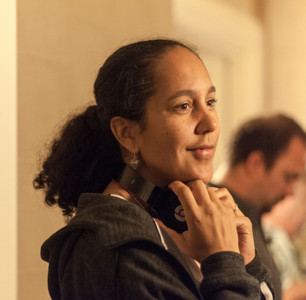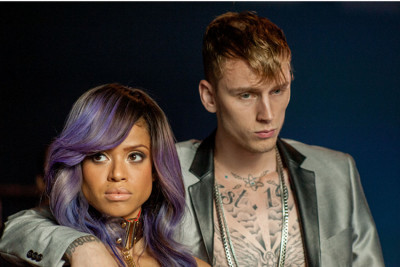Music is part of the very storytelling fabric of “Beyond the Lights”. With not only lyric tracks but scoring that is dynamic, pulsating and telling of the story and each individual character, writer/director Gina Prince-Bythewood set the musical bar high at the outset, not only for herself, but for Gugu Mbatha-Raw who, as Noni, has to perform both musically and in full stage performance dance.

According to producer Reggie Rock Bythewood, “[The music] actually started in the script process because Gina had the beats all in her head and was just writing some music. Part of the process was that I read the script and we kind of beat each other up, and the mantra there is that it has to be flawless as much as possible when it gets past me. So, we engaged in a lot of debate and arguing in a very positive way.”
As the script came together along with the musicality of it, for Prince-Bythewood, “It really started with Noni’s original music and knowing what we needed for that. Early on, the only target I had was The Dream [Terius Nash]. I knew that he could do the raunch at the beginning of the movie, but also write beautiful love songs like he does for Beyonce, and I wanted somebody at that level. We had to believe [Noni’s] songs would be playing with the radio. This being a music film, music was everything to this, so it started there with his original music and the work that both Debra Byrd [Mbatha-Raw’s vocal coach] and The Dream did with Gugu in the studio.”
In looking at the soundtrack as a whole, “[I]t was very important that the music mirrors her trajectory. I wanted to have a balance between established artists like Beyonce, but also some newcomers like Cynthia Erivo, who has such a beautiful track, and Yuna. I wanted to focus on songwriters as well. India [Jean-Jacques] and Rita [Ora] are in there. And I’m not even counting Nina Simone, who was a huge influence on this.” “Huge influence” indeed as it is Simone’s song “Blackbird”, initially sung acapella by young India Jean-Jaques, that sets the stage for what is to come in “Beyond the Light”.

However, as the story itself progresses, Prince-Bythewood describes it as having “more of that singer-songwriter vibe to it, which is where Noni was hoping to go.” Coupling that with the real artists that appear in the film, “and that’s really what was playing on the radio and at the Billboard Awards and in the conference room [on screen]” , it was important to have that innocence and ignorance that would be part of Noni’s existence.” Particularly effective are scenes with a somewhat mesmerized Noni and mother Macy Jean [Minnie Driver] off stage and “you’re hearing Kid Culprit’s [Machine Gun Kelly] music play and what he sang, and both Macy and Noni are sitting there not even paying attention to what is coming out of his mouth. It was just setting that scene and that tone early on, so that then as it progressed, we could get to more of the true artist that Noni wanted to be.”
Calling herself “very very fortunate”, Prince-Bythewood gives props to producers Stephanie Allain and Reggie Rock Bythewood, especially when it came to getting Machine Gun Kelly, not only to play Kid Culprit, but also for his music. “I knew I wanted a real hip hop artist, and that’s something that Stephanie, Reg and I talked about a lot, about bringing that authenticity, and that was tantamount for this film. In pushing for [MGK], it was a bit of a fight and the fact is, they had my back in terms of wanting to go that way.”
At the end of the day, Prince-Bythewood credits the excellence of the music and its emotional heartbeat within the storyline, with “having the foresight to put what we wanted in there and believing that it would resonate with audiences, and the studio would step up and give us a little extra for the music, and that’s exactly what happened.”












